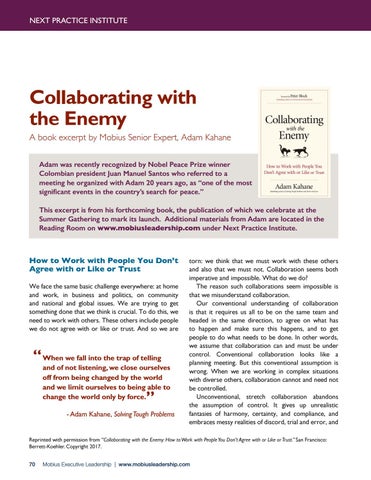NEXT PRACTICE INSTITUTE
Collaborating with the Enemy A book excerpt by Mobius Senior Expert, Adam Kahane Adam was recently recognized by Nobel Peace Prize winner Colombian president Juan Manuel Santos who referred to a meeting he organized with Adam 20 years ago, as “one of the most significant events in the country’s search for peace.” This excerpt is from his forthcoming book, the publication of which we celebrate at the Summer Gathering to mark its launch. Additional materials from Adam are located in the Reading Room on www.mobiusleadership.com under Next Practice Institute.
How to Work with People You Don’t Agree with or Like or Trust We face the same basic challenge everywhere: at home and work, in business and politics, on community and national and global issues. We are trying to get something done that we think is crucial. To do this, we need to work with others. These others include people we do not agree with or like or trust. And so we are
“ When we fall into the trap of telling
and of not listening, we close ourselves off from being changed by the world and we limit ourselves to being able to change the world only by force.
”
- Adam Kahane, Solving Tough Problems
torn: we think that we must work with these others and also that we must not. Collaboration seems both imperative and impossible. What do we do? The reason such collaborations seem impossible is that we misunderstand collaboration. Our conventional understanding of collaboration is that it requires us all to be on the same team and headed in the same direction, to agree on what has to happen and make sure this happens, and to get people to do what needs to be done. In other words, we assume that collaboration can and must be under control. Conventional collaboration looks like a planning meeting. But this conventional assumption is wrong. When we are working in complex situations with diverse others, collaboration cannot and need not be controlled. Unconventional, stretch collaboration abandons the assumption of control. It gives up unrealistic fantasies of harmony, certainty, and compliance, and embraces messy realities of discord, trial and error, and
Reprinted with permission from “Collaborating with the Enemy: How to Work with People You Don’t Agree with or Like or Trust.” San Francisco: Berrett-Koehler. Copyright 2017. 70
Mobius Executive Leadership | www.mobiusleadership.com

